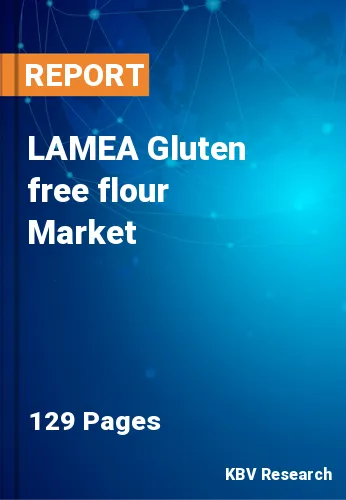The Latin America, Middle East and Africa Gluten Free Flour Market would witness market growth of 7.1% CAGR during the forecast period (2023-2030). In the year 2026, the LAMEA market's volume is expected to surge to 77.9 Kilo tonnes, showcasing a growth of 8.6% (2023-2030).
the upswing in weight management trends contributes significantly to the demand for gluten-free flour. Many individuals pursuing weight control and healthier eating habits find gluten-free diets appealing for their perceived benefits. In this context, gluten-free flour emerges as a pivotal ingredient, allowing people to indulge in various baked goods while adhering to their dietary goals. This dual influence of health consciousness and weight management trends underscores the growing significance of market.
Moreover, the expansion of specialty diets has emerged as a significant catalyst propelling the demand for gluten-free flour. With the increasing popularity of unique dietary approaches such as paleo and keto, which often exclude gluten-containing grains, there is a growing need for suitable alternatives. Consumers in these specialty diets seek gluten-free flour as a foundational ingredient to create diverse and satisfying meals that align with their nutritional preferences. As specialty diets become more mainstream, the demand for gluten-free flour experiences a corresponding surge.
The LAMEA region has diverse cultural and regional dietary preferences. Incorporating gluten-free flours aligns with these preferences, offering consumers a choice that caters to their specific culinary traditions and requirements. The rising middle-class population in certain LAMEA countries is associated with increased disposable income. Furthermore, according to the International Trade Administration, South African online sales increased 66% from 2019 to 2020 to more than $1.8 billion (ZAR30 billion). Online platforms often feature subscription services, allowing consumers in South Africa to subscribe to regular deliveries of their preferred gluten-free flours. This subscription model enhances convenience for individuals who prefer a continuous supply of gluten-free products. As a result, these aspects will boost the market growth in the coming years.
The Brazil market dominated the LAMEA Gluten Free Flour Market by Country in 2022, and would continue to be a dominant market till 2030; thereby, achieving a market value of $180.7 Million by 2030. The Argentina market is showcasing a CAGR of 7.7% during (2023 - 2030). Additionally, The UAE market would register a CAGR of 6.7% during (2023 - 2030).
Free Valuable Insights: The Worldwide Gluten free flour Market is Projected to reach USD 8.8 Billion by 2030, at a CAGR of 4.5%
Based on Application, the market is segmented into Bread & Bakery Products, Soups & Sauces, and Ready to Eat Products. Based on Source, the market is segmented into Legumes, and Cereals. Based on Product, the market is segmented into Almond Flour, Amaranth Flour, Oat Flour, Corn Flour, and Others. Based on countries, the market is segmented into Brazil, Argentina, UAE, Saudi Arabia, South Africa, Nigeria, and Rest of LAMEA.
By Application (Volume, Kilo Tonnes, USD Billion, 2019-2030)
By Source (Volume, Kilo Tonnes, USD Billion, 2019-2030)
By Product (Volume, Kilo Tonnes, USD Billion, 2019-2030)
By Country (Volume, Kilo Tonnes, USD Billion, 2019-2030)
Our team of dedicated experts can provide you with attractive expansion opportunities for your business.

